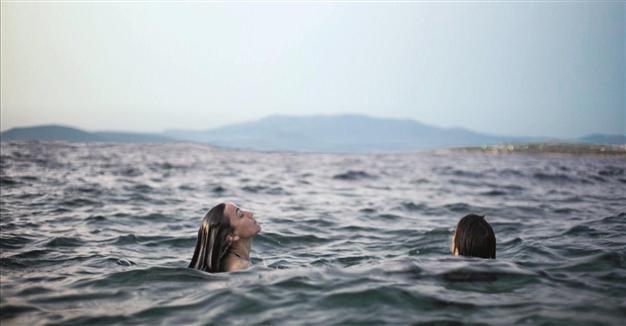Life aquatic with Turkish cinema
Emrah Güler

Bodrum Sea Films Festival between April 18-20 includes 11 Turkish and international feature films and documentaries.
“We have prepared a festival program that will excite the enthusiasts of adventure and the sea, those wanting to explore the unparalleled life beneath and above the sea,” said Murat Yılmaz, Director of Bodrum Deniz Filmleri Festivali (Sea Films Festival), in the press release. The southwestern coastal town, and the popular refuge for those running away from the hectic urban life, Bodrum is getting ready to celebrate the aquatic life on screen in a film festival this week.
Bodrum Sea Films Festival will run between April 18-20, and includes 11 Turkish and international feature films and documentaries. The first Turkish festival with the theme of the sea hopefully “will take the audience from the stress of everyday life, and take them on a faraway journey to the deep blue.” The festival will feature films on maritime culture, exploration of the sea, aquatic adventure sports, and man’s relation with the sea.
The highlight of the festival is the 2012 Norwegian historical drama “Kon-Tiki.” Directed by Joachim Rønning and Espen Sandberg, the film follows the legendary 1947 Kon-Tiki expedition by Norwegian explorer and writer Thor Heyerdahl across the Pacific Ocean from South America to the Polynesian islands in a raft. The film, as well as the raft, named after the Inca god of Sun was nominated for the Academy Award and the Golden Globe for Best Foreign Language Film.
The at once heart-breaking and heart-warming tale of the Turkish artist İlhan Koman’s lifelong dream and beyond coming to life will be told in “Hulda’nın Festivali” (Hulda’s Festival), a documentary directed by Piri Can Koman and Katherine Pastrana. Koman’s dream was to sail with his ship from Sweden through the Mediterranean to Turkey.

Kon-Tiki.
Coastal towns, a favorite setting in Turkish cinemaWhile he never set out to bring his dream to life, his family and friends brought it to life in his memory. Koman’s son Ahmet Koman renovated Hulda, and with friends created the Hulda Festival, a boat trip dedicated to art and sciences with several destinations, where exhibitions, performances and workshops take place. Get ready to watch the making of the festival in the documentary.
Another documentary on a man who has devoted his life to the sea is “Son Süngerci” (The Last Sponge Diver), story of the last sponge diver of Turkey. Aksona Mehmet, who got his nickname from his boat Aksona and who continues to dive in his 60s, sets sail to revisit the reefs of his memories across the Aegean, coasts off Bodrum and Kalymnos. This is the history of the Turkish and Greek sponge divers written on the screen.
The sea and the coastal towns, in fact, have been a major part of Turkish cinema since the 1970s, for different reasons through the decades, sometimes an integral part of the story, and at other times just as a visually capturing backdrop. Veteran film critic Atilla Dorsay summarizes in an interview the appeal of an increasing popularity in the use of Aegean and Mediterranean coastal towns as settings in Turkish cinema in late 1960s and 1970s. “One of the major reasons behind having small town stories in the Aegean as opposed to eastern Turkey is that life in the western towns was closer to life in big cities.”
For Dorsay, “Directors could talk about small town life without steering much from the problems of the urban middle class.” For many, an iconic image from that period comes to mind. Director Şerif Gören’s 1978 classic “Gelincik” (Poppy) is the familiar rich girl-poor boy story with the spoiled urban girl coming to a coastal town to fall for the local hunk riding his horse along the coast. The then-heartthrob Cüneyt Arkın on a horse is the timeless iconic image.

All Is Lost
Sea as the last refugeThe coast of the Mediterranean continues to serve as the last refuge of the Turkish intellectual and the political fighter in Turkish cinema. The small towns along the coast welcome the urban character, helping him to clear his conscience and face his demons. The first feature film to deal with the 1980 coup, for instance, was one of the prototypes of the loner at the coastal town.
Zeki Ökten’s “Ses” (The Voice) featured Tarık Akan, who himself was jailed after the coup, as a young man who moves to a coastal town to start a new life after spending years in prison. The effects of prison life were taken to a haunting level with the smooth tone of the film with a focus on peaceful life at the coast changing abruptly when the protagonist recognizes the voice of his torturer.
The coastal town has also served as the ultimate juxtaposition to the big city, in most cases Istanbul, and all that is wrong with city life. In this year’s award-winner “Kusursuzlar” (The Impeccables), director Ramin Matin takes its leading characters, two sisters to an idyllic Aegean town, to the summer house of their past.
The sea and the coast here serve as the hopeful remedy to their broken relationship, where they have to deal with a secret revealed gradually as the movie unfolds. The scene (giving the image to the film’s poster) of the two in the sea together is the dramatic turning point in the relationship of the two, as well as the film. It seems the sea, literally and metaphorically, will continue to inspire filmmakers.


